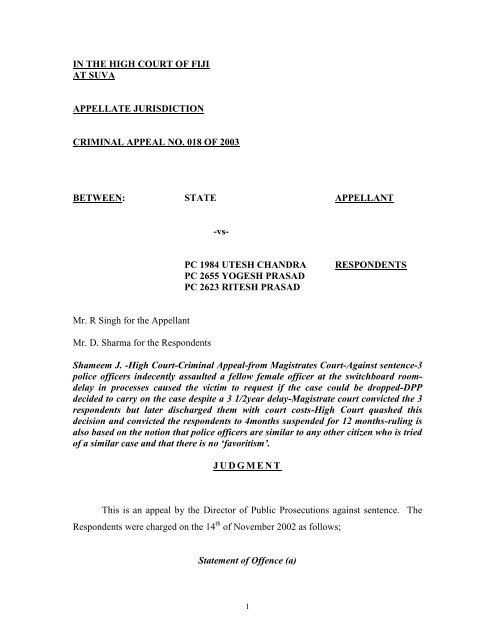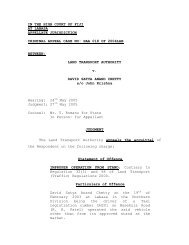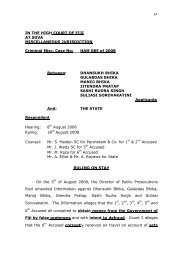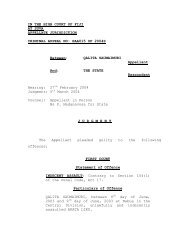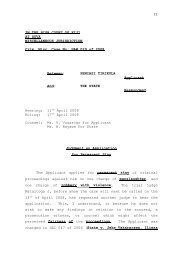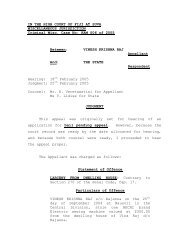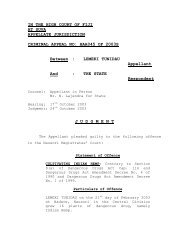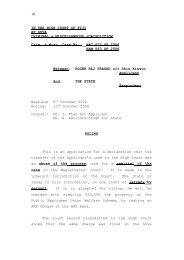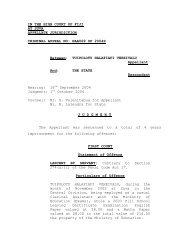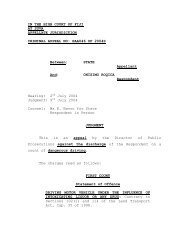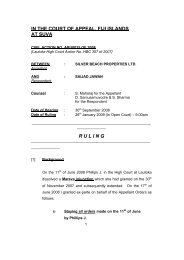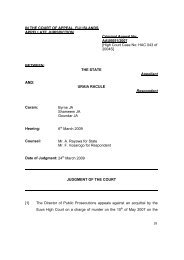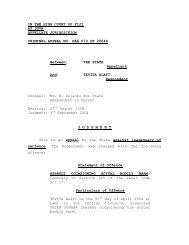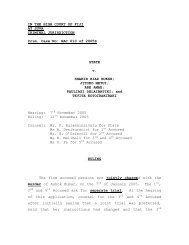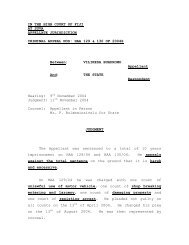Download State v Utesh Chandra and Others HAA018J.03S - Law Fiji
Download State v Utesh Chandra and Others HAA018J.03S - Law Fiji
Download State v Utesh Chandra and Others HAA018J.03S - Law Fiji
Create successful ePaper yourself
Turn your PDF publications into a flip-book with our unique Google optimized e-Paper software.
IN THE HIGH COURT OF FIJIAT SUVAAPPELLATE JURISDICTIONCRIMINAL APPEAL NO. 018 OF 2003BETWEEN: STATE APPELLANT-vs-PC 1984 UTESH CHANDRAPC 2655 YOGESH PRASADPC 2623 RITESH PRASADRESPONDENTSMr. R Singh for the AppellantMr. D. Sharma for the RespondentsShameem J. -High Court-Criminal Appeal-from Magistrates Court-Against sentence-3police officers indecently assaulted a fellow female officer at the switchboard roomdelayin processes caused the victim to request if the case could be dropped-DPPdecided to carry on the case despite a 3 1/2year delay-Magistrate court convicted the 3respondents but later discharged them with court costs-High Court quashed thisdecision <strong>and</strong> convicted the respondents to 4months suspended for 12 months-ruling isalso based on the notion that police officers are similar to any other citizen who is triedof a similar case <strong>and</strong> that there is no ‘favoritism’.J U D G M E N TThis is an appeal by the Director of Public Prosecutions against sentence. TheRespondents were charged on the 14 th of November 2002 as follows;<strong>State</strong>ment of Offence (a)1
INDECENT ASSAULT ON FEMALE: - Contrary to Section 154 of Penal Code, Cap17.Particulars of Offence (b)PC 1984 UTESH CHANDRA, PC 2655 YOGESH PRASAD <strong>and</strong> PC 2623 RITESHPRASAD, on the 21 stday of December, 1999, in Suva in the Central Division,unlawfully <strong>and</strong> indecently assaulted WSC 99 PRATIBHA KIRAN d/o Daya Ram.The history.All three Respondents pleaded not guilty. Before the trial commenced there weresome submissions made to the learned Magistrate, that the complainant wished towithdraw her complaint, <strong>and</strong> that the prosecution was an abuse of the process because thecharge related to an event in December 1999. The prosecution responded that the DPPhad decided to proceed despite the complainant’s reluctance <strong>and</strong> that the delay in thelaying of charges was caused by the failure of the police to forward the file to the DPP’soffice before 11 th November 2002. The learned Magistrate ruled that the matter shouldproceed in the public interest.The trial commenced on the 8 th of January 2003. The evidence led revealed thatthe complainant was a Special Constable who had joined the Police force in 1998. Herduties were to take care of the switchboard <strong>and</strong> to do orderly duties. On the 21 st ofDecember 1999, after 11pm she was sitting at the switchboard when the three2
were married <strong>and</strong> were breadwinners <strong>and</strong> that convictions should not be entered againstthem.In sentencing the Respondents, the learned Magistrate took into account the delayin the laying of charges, the fact that the complainant was on good terms with theRespondents <strong>and</strong> that the incident occurred around Christmas time. She warned all threeRespondents to desist from such conduct in the future <strong>and</strong> said that they appearedremorseful. She then decided not to enter a conviction against the Respondents. Shewent on to say: “Further, given the circumstances of the case pursuant to Section 169 ofthe Criminal Procedure Code I reduce the charge to Section 154 (4) of the Penal code.Persuasive mitigation by counsel has convinced the court to allow the three gentlemenanother change <strong>and</strong> to discharge their matter pursuant to Section 44 of the Penal code.However as a further deterrent along with the stern warning given already they are eachcharged court costs of $200 each to pay today”.The appeal.The grounds of appeal are that the sentence imposed was wrong in principle <strong>and</strong>manifestly lenient in all the circumstances of the case.At the learning of the appeal, it was agreed by both counsels that having found theRespondents guilty of indecent assault under Section 154 (1) of the Penal Code it wasnot open to her to substitute another offence during sentence. Section 154 (1) provides:5
“Any person who unlawfully <strong>and</strong> indecently assaults any woman or girl isguilty of a felony, <strong>and</strong> is liable to imprisonment for five years; with or without corporalpunishment”.Section 154 (4) provides;“Whoever intending to insult the modesty of any woman or girl, utters any word,makes any sound or gesture, or exhibits any object, intending that such word or soundshall be heard, or that such gesture or object shall be seen, by such woman or girl orwhoever intrudes upon the privacy of a woman or girl by doing an act of a nature likelyto offend her modesty, is guilty of a misdemeanour, <strong>and</strong> is liable to imprisonment for oneyear”.Section 169 of the Criminal Procedure Code provides;“(1) When a person is charged with an offence consisting of several particulars,a combination of some only of which constitutes a complete minoroffence, <strong>and</strong> such combination is proved but the remaining particulars arenot proved, he may be convicted of the minor offence although he was notcharged with it.6
(2) When a person is charged with an offence <strong>and</strong> facts are proved whichreduce it to a minor offence, he may be convicted of the minor offencealthough he was not charged with it”.This provision only applies when the court finds that some of the elements of theoffence are not proved. Clearly, this was not such a case. There was clearevidence of an assault by the three Respondents, both individually <strong>and</strong> jointly, <strong>and</strong>of indecency <strong>and</strong> unlawfulness. The learned Magistrate made a finding that shewas satisfied beyond reasonable doubt of the Respondents guilt on the charge ofindecent assault. It was not open to her to later substitute a conviction foranother offence.Further, I doubt that Section 154 (4) is a lesser offence in relation toSection 154 (1). Section 154 (4) requires proof of the intrusion of the privacy ofa woman <strong>and</strong> of the likelihood that her modesty will be offended. These are notelements of the offence of indecent assault. Lastly, she purported to reduce thecharge at the stage of sentencing. At that stage, neither prosecution nor defencecould respond to the substituted charge. Section 169 (1) <strong>and</strong> (2) apply at the timeof conviction (or of the finding of guilt) not at the time of sentence. The soonerthe possibility of a lesser offence can be raised, the better because of the resultingprejudice to the accused. In R v Harris, The Times March 22, 1993 the EnglishCourt of Appeal quashed a conviction for attempt when the alternative charge ofattempt was raised for the first time after the close of the defence case, on the7
ground that the defence would have been conducted differently if the alternativehad been raised. The defendant was therefore prejudiced in his defence.Thus in this case I find that the learned Magistrate had no powers toreduce the charge when she had already found the substantive offence provenbeyond reasonable doubt. It follows that her finding of guilt under Section 154(4) of the Penal Code is wrong in law <strong>and</strong> must be quashed. The sentence is alsoquashed because she was sentencing for an offence under Section 154 (4) forwhich the statutory maximum is only one year, <strong>and</strong> in respect of which there wasno finding of guilt.The absolute dischargeThe learned Magistrate considered that this was an appropriate case for anabsolute discharge on the ground that the Respondents were remorseful <strong>and</strong> hadreconciled with the victim.It has been said on many occassions in <strong>Fiji</strong> <strong>and</strong> in other jurisdictions, thatthe absolute discharge should be reserved for those cases where the offender wasnot morally blameworthy or where there was a mere technical breach of the law.There can be no dispute that this case falls into neither category. In <strong>State</strong> v N<strong>and</strong>Kumar Criminal App No. HAA 014 of 2000 L, Gates J considered an appeal in8
espect of an absolute discharge for the offence of common assault. At page 9 hesaid;“The court, in its sentencing remarks, said rightly, it was faced with “avery awkward situation” for this accused was facing dismissal from hisemployment if a conviction were to be entered. Nevertheless, a discharge withoutconviction being entered, was not an appropriate sentence here.Absolutedischarges are appropriate only in a limited number of circumstances, such aswhere no moral blame attaches (R v O’Toole (1971) 55 Cr App p 206) or wherea mere technical breach of the law has occurred, perhaps by imprudence withoutdishonesty (R v Kavanagh (unreported) May 16 th 1972 CA)”In Carol Mitchell Tabutt v The Commissioner of Inl<strong>and</strong> RevenueCriminal Appeal No. 108 of 1998S, the appellant was found guilty of offencesunder the Income Tax Act.She was discharged without conviction underSection 44 of the Penal Code. The Commissioner appealed against sentence <strong>and</strong>the High Court set aside the discharge <strong>and</strong> entered a conviction imposing fines.On appeal to the Court of Appeal, the Court held that the appellant herself wasresponsible for her offending <strong>and</strong> that an absolute discharge on the facts was notappropriate. It cited with approval Scott J’s remarks in Commissioner of Inl<strong>and</strong>Revenue v Atunaisa Bani Druavesi (Criminal Appeal No. HAA 0012 of 1997which were as follows;9
“Perhaps it is time to re-emphasize that the powers conferred by Section44 (1) of the Penal Code should only be exercised sparingly (see Halligan vPolice (1955) NZCR 1185) where the direct or indirect consequences ofconvictions are out of all preparation to the gravity of the offence <strong>and</strong> after theCourt has balanced all public interest considerations as they apply in the particularcase (see Tipple v Police (1994) 2 NZLR 362)”In <strong>Fiji</strong>, sentences for indecent assault range from 1 year to 4 yearsimprisonment. Sentences at the higher end of the tariff have been imposed for theindecent assault of children. An excellent review of sentences passed for offencesof indecent assault can be found in Ratu Veretariki Kadavu v The <strong>State</strong>Criminal Appeal No. HAA 049 of 2000L. The indecent assault of adults isgenerally considered less serious, but a betrayal of trust, or the exploitation of arelationship of authority <strong>and</strong> seniority would be aggravating factors. The type ofassault involved is also relevant. A penetrative assault, or the use of weapons orsubstances would normally attract a higher sentence than, for instance, a forcedkiss or the fondling of breasts. However, in my perusal of cases of indecentassault in <strong>Fiji</strong>, a non-custodial sentence is rare. In Iqbal Koya v The <strong>State</strong>Criminal Appeal No. 0048 of 1999, Fatiaki J imposed a 9 month term on a courtof indecently annoying female contrary to Section 154 (4) of the Penal Code in acase of a man exposing his genitals to a woman. In Asaeli Tamanitoakula v The<strong>State</strong> Criminal Appeal No. 003 of 2001, Surman J reduced a 2 ½ year term ofimprisonment to 9 months imprisonment where the victim was a nine year old girl10
who had been indecently assaulted by the touching of her vagina. In DPP vSaviriano Radovu Criminal Appeal No. 0006 of 1996, Fatiaki J imposed a 9month sentence for an accused who indecently assaulted a 9 year old child byfondling her breasts. In Arun Kumar v <strong>State</strong> Criminal Appeal No. 3 of 1995 theLabasa High Court reduced a 9 months term of imprisonment to one of 3 monthsfor a man who kissed an adult woman by force.I was unable to find any local decisions on sexual assault in theworkplace. However, in Gurinder Singh –Marwa (1995) 16 Criminal AppealR (S) the English Court of Appeal considered a sentence of 21 monthsimprisonment imposed on appellant who pleaded guilty to the indecent assault ofan 18 year old woman who had applied for a job in the appellant’s business. Theappellant had interviewed her, then taken her into a locked room, pulled her shirtup <strong>and</strong> fondled her breasts.The sentence was reduced to 15 monthsimprisonment but the Court found that the sentencer was right to conclude that theoffence was so serious that only a custodial sentence could be justified. Thevictim was anxious to obtain employment <strong>and</strong> therefore vulnerable.In Andrew McDonald Drysdale (1993) 14 Criminal Appeal R (S) a malenurse placed his finger in the vagina of a student nurse whilst showing her how todeal with a patient. A sentence of 6 months imprisonment was upheld for thecharge of indecent assault.11
Although the statutory maximum for indecent assault in Engl<strong>and</strong> <strong>and</strong>Wales is now 10 years imprisonment, these cases make clear that where indecentassaults take place in a work environment <strong>and</strong> where there may be somedegree of economic superiority over the victim, custodial sentences areinevitable.As a starting point therefore, given the nature of the offending, I choose 9months imprisonment.The aggravating factors are that the victim was acolleague of the Respondents <strong>and</strong> deserved to be treated with respect <strong>and</strong> dignity,that this was a case of an indecent assault in the workplace <strong>and</strong> that theconsequences of the assault must have been far-reaching for the victim, the factthat the three Respondents acted in concert to assault a woman knowing she couldnot defend herself against three men, <strong>and</strong> the nature of the assault which includedfondling of the breast.Mitigating factors are the previous good character of the Respondents, thefact that they have been suspended from duties from November 2002 without pay,the fact that despite the incident they are on good terms with the victim theirfamily circumstances <strong>and</strong> the delay in filing the charge.imprisonment.Taking all these matters into account, I arrive at a sentence of 4 months12
Should this sentence be suspended? A suspended sentence should onlybe imposed in the most exceptional circumstances <strong>and</strong> only when there areconsiderations which persuade the court that an immediate custodial sentencewould be unjust. In this case, I do so consider. The offence was committed inDecember 1999, 3 ½ years ago. The victim, frustrated with the delay, lost interestin the case. Although I see no evidence of remorse on the court record, there hasbeen some degree of reconciliation. I do not know what price (if any) the victimpaid for reporting on her own colleagues within the Police Force, but her courage<strong>and</strong> resilience have obviously assisted her in maintaining cordial relationshipswith the Respondents.In all the circumstances, <strong>and</strong> particularly because of the delay, I suspendthe term of imprisonment for 12 months for each Respondent.I was advised by counsel that the entering of convictions in this casewould probably lead to disciplinary action by the Police Force <strong>and</strong> may lead to thedismissal of the Respondents. However, I am not persuaded to enter a dischargewithout conviction.Firstly, I can find no comparable case which led to adischarge. Secondly although I am aware that the Respondents should not begiven a sentence which would exceed the gravity of the offence, I consider thatthe courts need to send a message to the community that police officers whocommit criminal offences will not be subjected to different rules from the restof the community. Thirdly, this is a case of an indecent assault by three men13
acting jointly on a colleague in the workplace. It is not a case in respect ofwhich an absolute discharge is appropriate. Women in the workplace are entitledto be treated with dignity <strong>and</strong> not discriminated against on the ground of theirgender. A custodial sentence, <strong>and</strong> the entering of convictions are appropriate inthe circumstances. Indeed, if it were not for the delay, I would not be minded tosuspend the sentence.ResultThis appeal succeeds on both grounds. A conviction is entered for eachRespondent for the charge of indecent assault contrary to Section 154 (1) of thePenal Code. Each Respondent is sentenced to 4 months imprisonment suspendedfor 12 months. Each is warned in terms of Section 29 (4) of the Penal Code. Thecosts order remains.N. ShameemJUDGE14


